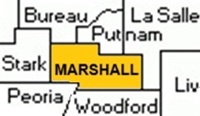
Colonel Robert Boal FORT, who through the period of his comparatively brief but intense active and useful life was termed "the foremost citizen of Marshall county," was born April 26, 1867, in Lacon, Illinois, the only son of Colonel Greenbury Lafayette and Clara (BOAL) FORT. During his father's official service in Washington, D. C., he began his education, which was later continued in Wyman Institute and Exeter Academy. He completed his studies abroad and in various visits to the old world gained that wide knowledge and general culture which only travel can bring. He prepared for the bar but never engaged in active practice. He was the owner of landed possessions in Illinois and Nebraska and in the control of farming operations in both states he displayed discrimination and executive ability. Through careful management his wealth was augmented and he derived his greatest pleasure from its use in administering to the happiness and welfare of others. His beneficence became almost proverbial and yet no man was more reticent concerning his kindly acts or free from ostentation in his charities. He never personally made mention of his benefactions but the story is told by the recipients of his kindness and in their hearts his memory is enshrined.
Robert Boal FORT stood as a splendid representative of the highest type of American manhood of the present age. He looked at life from the broad standpoint of citizenship and of individual responsibility and brought to bear upon all the questions with which the public mind is concerned the thorough understanding which comes from close study, combined with a sense of personal responsibility. This was one of the strong elements in his political service. His maternal grandfather was one of the founders of the republican party in Illinois. His father was representative from his district in the legislative councils of the nation and in the state senate, and from his boyhood Robert FORT was imbued with the deepest interest in the important issues which divide the two great parties. At the age of twenty-one he was a county central committeeman, filling that position until his election, in 1895, to the office of mayor of Lacon. Before the expiration of his two years' term he was elected to represent the twentieth senatorial district in the state senate thus becoming the successor of his grandfather and father in the legislative halls of the commonwealth. During the period of his service in the senate, covering altogether seven years, he was connected with much important constructive legislation, showing his thorough understanding of the needs and possibilities of the state in its various lines of material development and political progress.
In 1898, a few days after the destruction of the Maine, Colonel FORT visited Cuba and after a brief stay in Havana made a tour through the provinces of Matansas and Santa Clara, spending some time with the Cuban insurgents. Learning that war was imminent between his country and Spain he returned to the United States and raised a troop of cavalry. He made every effort to secure an order for his men to go to the front, but only succeeded in advancing as far as Chickamauga. Following the election of Governor YATES he was made colonel of the First Illinois Cavalry and a colonel on the personal staff of the governor. At the time of his death he was prominently mentioned as candidate for lieutenant governor and had he lived would undoubtedly have received the nomination. In his political service he manifested none of that ultra-conservatism which has hampered the efforts of many political leaders, but stood as an exponent of the spirit of the times which recognizes changing conditions and seeks legislation which will eradicate existing evils, bring about needed reforms and anticipate future demands. These qualities, together with his recognized devotion to the highest standards of political service, naturally caused his opinions to carry weight in the councils of his party and made him a recognized leader in Illinois political circles.
The stress of business or politics was never so great with Robert FORT as to shut out from his life the friends of his earlier years and only a great nature is steadfast. It was those who knew him best that appreciated to the fullest extent the kindness of his heart. His efforts in behalf of others were prompted by the simple joy of doing good. He valued so-called "society" at its true worth and found his companionship among the men of master minds who are concerned with the weighty serious problems of life and yet delight in all that is joyous and ennobling. He was of that type of men who "listen to babes and sages, birds and stars, with open heart," learning the lessons of life from all. He attended the Episcopalian church but his religion, knowing no barriers of creed or dogma, found exemplification in the helpful spirit which he bore toward all. There was not an individual too humble or obscure to arouse his interest or awaken his sympathy and receive his assistance if such were needed. He passed away after a very brief illness, in Springfield, May 21 1904, at the age of thirty-seven years. There are those who win honor and fame, who command respect, who receive admiration but there are few men who are uniformly beloved; but the consensus of public opinion concerning Robert Boal FORT was that "he was one of the few young men who were beloved by all." One of his most distinguishing traits was his kindness of heart and generosity to his home people. He was one of those fascinating characters who throw around them much of the sunshine of life. Those who knew him best delighted to honor him and he was worthy of all honor.
Extracted July 2011 by Norma Hass from Past and Present of Marshall and Putnam Counties Illinois, 1907.
| Bureau Putnam La Salle | |||
| Stark |
 |
||
| Peoria | Woodford | ||

